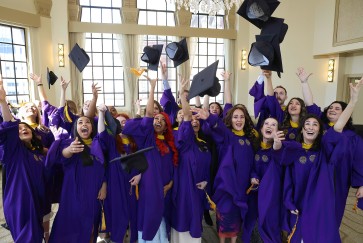Northwestern has established the Office of FGLI Initiatives to facilitate campus collaboration on strategies and policies that better support the University’s growing population of first-generation and low-income (FGLI—pronounced fig-lee) students. Housed within the Office of the Provost, the Office of FGLI Initiatives has two primary goals: Promote the success of FGLI students and provide a more equitable experience both in and out of the classroom.
“Northwestern is a decentralized institution, which can make it difficult for students to find their place—especially FGLI students who may not have a support structure or family with the experience to help guide them,” Senior Director of FGLI Initiatives Michael Fitzpatrick said. “Through hands-on units such as Student Enrichment Services and school-based programs, Northwestern has a lot of great and varied supports in place to support FGLI students. The Office of FGLI Initiatives strives to complement these services and to identify persistent barriers that we can work together to eliminate.”
First-generation students make up 15 percent of this year’s entering class
First-generation students represent 15 percent of the entering undergraduate class this Fall, nearly double the representation in the class of students who arrived at Northwestern in 2010. Pell Grant recipients similarly represent 22 percent of this Fall’s entering undergraduate students, up from 14 percent from those who entered in 2010.
The Office of FGLI Initiatives has identified three key areas of work to meet the needs of these students:
- Identifying and advancing the development of policies that attend to the emerging needs of first-generation and lower-income students at Northwestern.
- Collaborating with schools and units across campus to create and enhance policies that foster an inclusive campus community.
- Providing leadership, coordination and support for programs intended to support first-generation and lower-income students in their academic endeavors at Northwestern.
As a truly collaborative unit, the Office of FGLI Initiatives is working with student support offices such as Student Enrichment Services, the Office of Undergraduate Financial Aid, Residential Services, and the Office of International Student and Scholar Services to support FGLI undergraduates across the University. The office also is partnering with school-based units to coordinate activities, enhance policies and ensure equal access to necessary supports and services.
Since the Office of FGLI Initiatives was established in the spring, it has taken over management of Books for ’Cats, a program that offers eligible first-year students the ability to borrow course materials (including textbooks, clickers, access codes, and lab equipment) in more than 100 selected introductory courses.
“As a former FGLI student, I recognize why entering a place like Northwestern can be such a challenge,” Fitzpatrick said. “The expectations and realities of the college experience do not always align, and it can sometimes feel like you’re the only person on campus to be struggling in a particular way. The Office of FGLI Initiatives partners with our colleagues to help make Northwestern a more welcoming place for FGLI students and foster a community that is vibrant and representative of all students on campus.”


